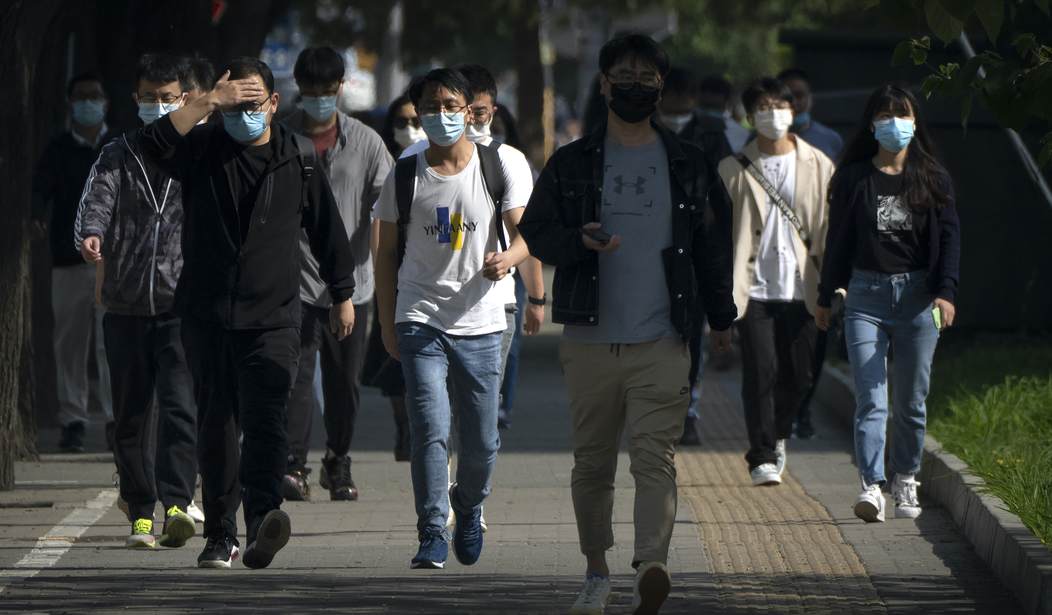According to recent media accounts, scientists in China have developed “high-tech” face masks that warn the individual wearing the mask that they have come into contact with the dreaded coronavirus. This is but the most recent chapter in the now nearly three-year long global overreaction to COVID-19. It is also perhaps one of the silliest, even though it presents interesting future applications.
Chinese researchers proudly claim that the masks not only will alert the wearer if he or she is in the presence of airborne coronavirus pathogens, but will likewise warn the individual if nearby swine flu or bird flu particles pose an imminent danger. The state-of-the-art masks, however, have one serious drawback – it takes 10 minutes for the mask to alert the wearer’s cell phone app that they are in the presence of the dread, disease-bearing molecules. The mask’s developers, however, “hope to shorten the detection time” even as they work to enable the detection mechanisms in the mask to alert to other “health conditions including cancers and cardiovascular diseases.”
While the scientists working on this project convey great hope for the future of such high-tech masks, there remain significant questions about the usefulness of the devices. For example, if you are wearing one of these masks in the future, it is unclear what would be the benefit of alerting you that you are near someone with cancer or heart failure (other than perhaps to console them).
Still, the mere idea that wearing a high-tech mask can allow you to take swift (or not-yet-so-swift) evasive action to avoid dangerously long exposure to a virus or other ailment, is an interesting one. The concept is certain to find special appeal for a generation of young people weaned on fear of virtually everything, but especially afraid of becoming even moderately ill. For them, wearing a mask is just a part of getting dressed.
Recommended
This recent and ongoing development and availability of high-tech masks for persons ever fearful of coming into contact with another person who might sneeze or cough in their vicinity, presents us with a number of possibilities that researchers and scientists could pursue in expanding the technology’s reach.
For example, consider the marketability of really high-tech masks that could alert the wearer’s cell phone if they are in the presence of a person harboring unacceptable political beliefs. A red high-tech mask could warn the wearer if an individual holding unacceptably Democrat political beliefs is near, and afford him or her time to take evasive, other defensive or perhaps even offensive action. A blue mask would similarly allow the Democrat donning the mask to avoid contact with Republican partisans, and, depending on the sensitivity rating of the particular mask, issue a perhaps even higher warning if a feared “MAGA” supporter is near.
Businesses likely would be drawn to the masks as a marketing tool, whereby shoppers or potential customers wearing masks could be warned away from competitors’ products or cheaper alternatives.
And consider how such high-tech masks could greatly improve the efficiency of law enforcement, as police and other investigators constantly are looking for ways to expand the use of technology to take the place of old-fashioned policing.
FBI agents, for example, could wear masks that would alert them to the presence of a “lone wolf” perpetrator, or that would allow them to quickly (or at least within 10 minutes if that is the delay time) arrest suspects who slough off warning signs of criminally evasive behavior (akin to the “drug courier profile” developed in the last decades of the 20th Century to assist DEA agents and other law enforcement teams in identifying such scofflaws at major airports and on interstate highways).
Masks tailored for use by foreign intelligence experts would provide a similar boon for detecting spies in their midst.
Truly, the possibilities of these high-tech masks are myriad, even for use by moms and dads who, for centuries, have faced the problem of figuring out if their offspring are lying to them. No longer would this be a 50-50 conundrum for the parent sporting a lie-detecting high-tech mask.
We can only hope that the Chinese scientists who are developing COVID-detecting high-tech masks (probably some of the same scientists who unleashed the coronavirus to begin with) accelerate their research to lay the groundwork for entrepreneurs and bureaucrats here in the West to apply the technology in all manner of privacy-invasive ways.
Bob Barr represented Georgia’s Seventh District in the U.S. House of Representatives from 1995 to 2003. He served as the United States Attorney in Atlanta from 1986 to 1990 and was an official with the CIA in the 1970s. He now practices law in Atlanta, Georgia and serves as head of Liberty Guard.

























Join the conversation as a VIP Member